How to Embrace Teaching Our Kids About Different Cultures
I'm Cuban, and teaching my son about Mexican culture
Welcome! We’re a community of parents and caretakers navigating the ups and downs of raising humans born in 2010-2024. Generation Alpha kids are incredibly diverse, digitally native, globally connected, dedicated to inclusivity, and care deeply about climate activism. Click here to join the conversations and find the support you need.
All parents have grandiose ideas of what will happen when they have kids, don’t we? And for those of us who are bilingual and bicultural, one of the biggest things we dream about is our child one day understanding and loving their cultural heritage.
That’s certainly how it is for me as a Latina living in the U.S.
Coming Up Cuban
I was born in Moscow, Russia, to a Russian mom and Cuban dad. You might be able to tell my heritage from my name—Irina Gonzalez—which I now consider a perfect combination of my two cultures. Irina is a very common name in Russia and Gonzalez, well, I’m sure you can tell.
If you met me in real life, you might not be able to tell that I’m an immigrant right away. I don’t have an accent in English and, in fact, have made my living as a journalist, editor, and writer for the entirety of my adult life. Plus, well, I’m a white-passing Latina.
But when folx hear or read my full name, they know at the very least that my family isn’t “from here,” meaning the United States of America.
Throughout my childhood, I used to say that I was “half-Russian, half-Cuban” and then added “and all-American” at the end as I grew up. But one of the most important things I learned when I left Florida (where my immigrant family lived) is that there is no “half” when it comes to your cultural heritage. I can’t just magically divide half of my body’s DNA and say “this is the Cuban part.”
The second most important thing I learned as I began to explore other Caribbean and Latin American cultures in adulthood is that Latinidad is vast and varied.
Growing up, I was pretty much only around Cuban people that I was related to or that my relatives were friends with. That’s not exactly a wide example of Latinx peoples—nor was it a great example of Cubans since that side of my family is all mainly descendant from Spain with very little Taíno blood (if Ancestry.com is to be believed).
(Note: the TaÍno were the Indigenous peoples of Cuba and the Caribbean. Read more about their history and today’s descendants here.)
Plus, I’ll be honest, most of the Cuban people I knew growing up were pretty racist (which I never understood considering we’re often the subject of racism in the U.S.) against their own Afro-Cuban brothers and sisters.
Speaking Spanish
I guess I grew up a little too inside of my own world to know about the beauty of Latin culture across the globe until I was an adult. But once I understood, I became very excited about exploring what makes us unique and what we share.
As you can imagine, the shared language of Spanish is often the go-to when it comes to non-Latinx people in the U.S. and even our own people finding commonality among someone who is Cuban like me and someone who is, for instance, Mexican. In fact, the Spanish language is what unites us when it comes to the term “Hispanic” that was popularized in the U.S. in the 1970s. (Note: I wrote about this and the modern term “Latinx” for OprahDaily.com in 2021, read the article here.)
But not every person of Latin American and/or Caribbean descent speaks Spanish.
And despite me being trilingual myself, I have struggled with feelings that my Spanish isn’t good enough to teach my son the language. I even wrote about that fear for Parents.com back in 2020 when my son was just barely six months old, and the update is that, well, I still haven’t taught him any Spanish. It’s not something I’m super proud of, to be honest.
Which brings me back to what I started with: grandiose ideas of what will happen when I had a kid.
Since I grew up speaking Spanish myself, I always imagined that my son Rio—who purposefully has a Spanish language name—would speak it, too.
But the reality is that I don’t live in a household where Spanish is spoken since my husband is American and we communicate only in English. Additionally, I am no longer in touch with my parents (both of whom speak Spanish) so Rio doesn’t have that influence either. And most of all, I myself don’t even speak Spanish regularly since even my Latinx friends are English-dominant.
So I don’t know if Rio will ever learn Spanish, though I still hope so.
Learning the Culture
This year, I discovered something even better than teaching my son Spanish.
I discovered that teaching Rio about Latinx culture is what I really, truly want to do. And not just about my own upbringing in a Cuban household but rather I want him to learn about all of the colorful, vibrant, beautiful things that exist throughout Latin America and the Caribbean.
I want him to learn about Peru and Argentina and Puerto Rico and Bolivia and Nicaragua and Mexico, and everyone and everywhere else that makes up the true richness of Latin culture across the world.
And so, this past weekend, my family and I made the trek from the suburbs of Denver to visit Breckenridge, Colorado, where a Dia de Los Muertos festival was being held.
Here’s what happened: I. EFFING. LOVED. IT.
Although the event was small and we didn’t get there early enough to experience all of it, I came away feeling elated after absorbing even a tiny fraction of Mexican culture and history.
I loved seeing Rio explore an airbus that featured different art and colorful representations of Mexico and Dia de Los Muertos, over and over again. Seriously, the kid asked to go in there at least five times! We even got to color a little flag (Cuban, of course) and stick it into a styrofoam display with other LatAm flags that kids had created.
And I loved dancing with Rio to the music that was played in one of the plazas, and then watching the Aztec Dance presentation by Grupo Huitzilopochtli. It was a truly magical experience and I am so, so glad we went.
Mi Cultura, Tu Cultura
Ultimately, I came away from the daylong excursion feeling inspired to explore more of my own heritage but especially the cultural heritage of my people—Latinx people. Or Latine people. Or Hispanic people. Whatever you want to call us.
Through this experience, I learned that it’s not necessarily that I want Rio to learn to speak my mother tongue (Spanish) or that I want him to know Cuban history. It’s that I want him to love and appreciate his roots and the roots of the people around him.
I want him to know about his Cuban side, his Russian side, his German and Polish and American side (courtesy of dad), but I also want him to know about the cultura of the people who live alongside him.
It took me a long time to feel Cuban due to negative experiences with some of the older Cuban people I met growing up. The racism, the sexism, the machista culture… I couldn’t stand any of it, so I rejected that side of myself for a long time.
I didn’t know how beautiful my culture—and adjacent Latin American and Caribbean cultures—could be. I didn’t experience the warmth, the beauty, the splendor, the celebrations. Not until I went to college and lived in New York City for 12 years.
I don’t want Rio to feel that way.
What I want for him—as a trilingual, tricultural immigrant and American—is to embrace all sides of himself and, even more so, all sides of other people.
It’s a complicated thing to teach your child about their heritage when you aren’t naturally surrounded by it, and I know so many fellow Latinx parents and friends who struggle with this too. But if there’s anything I learned this weekend, it’s that culture isn’t just one thing.
It’s not just language. It’s not just a Day of the Dead celebration. It’s not just food or a flag or even family.
It’s about the overall experience of seeing differences in our world and loving what makes us unique, being open to what makes us special, and connecting on a human level about what ultimately makes us the same—the reality of being alive.
I can’t wait to explore more about Latinidad in the years to come, and I can’t wait to explore other cultures around the world with Rio, too. I hope you’ll join me.
What’s your cultural heritage? What makes it special? And how are you teaching (or hoping to teach) your children about their family’s background?
Talk soon,
Irina (she/her) - raising a March 2020 gen alpha kid

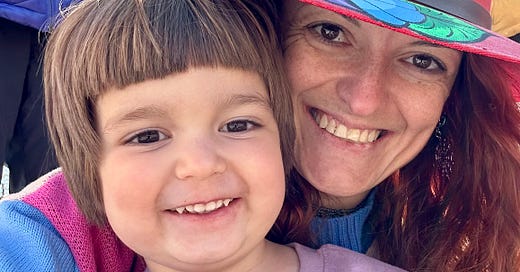



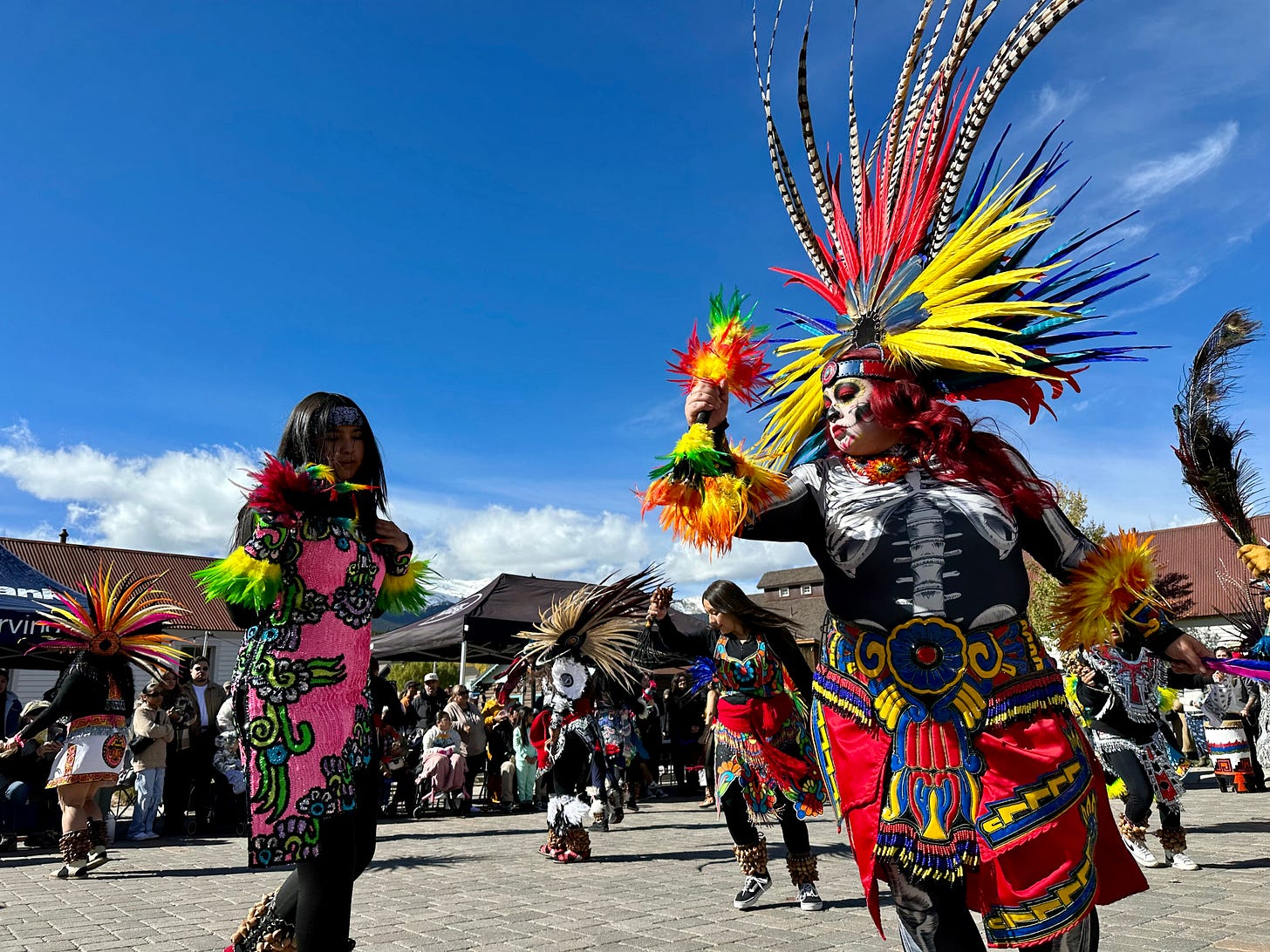
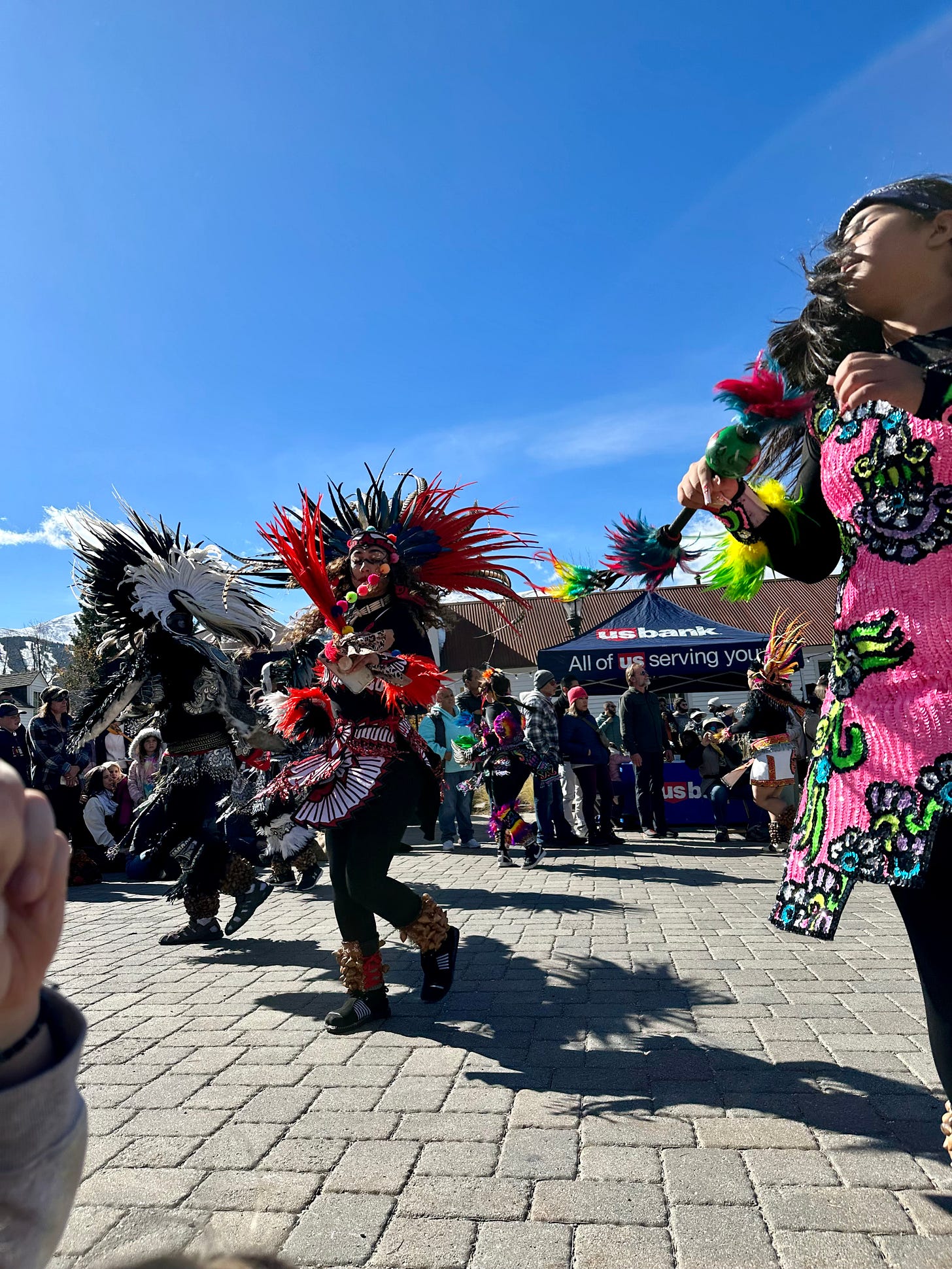
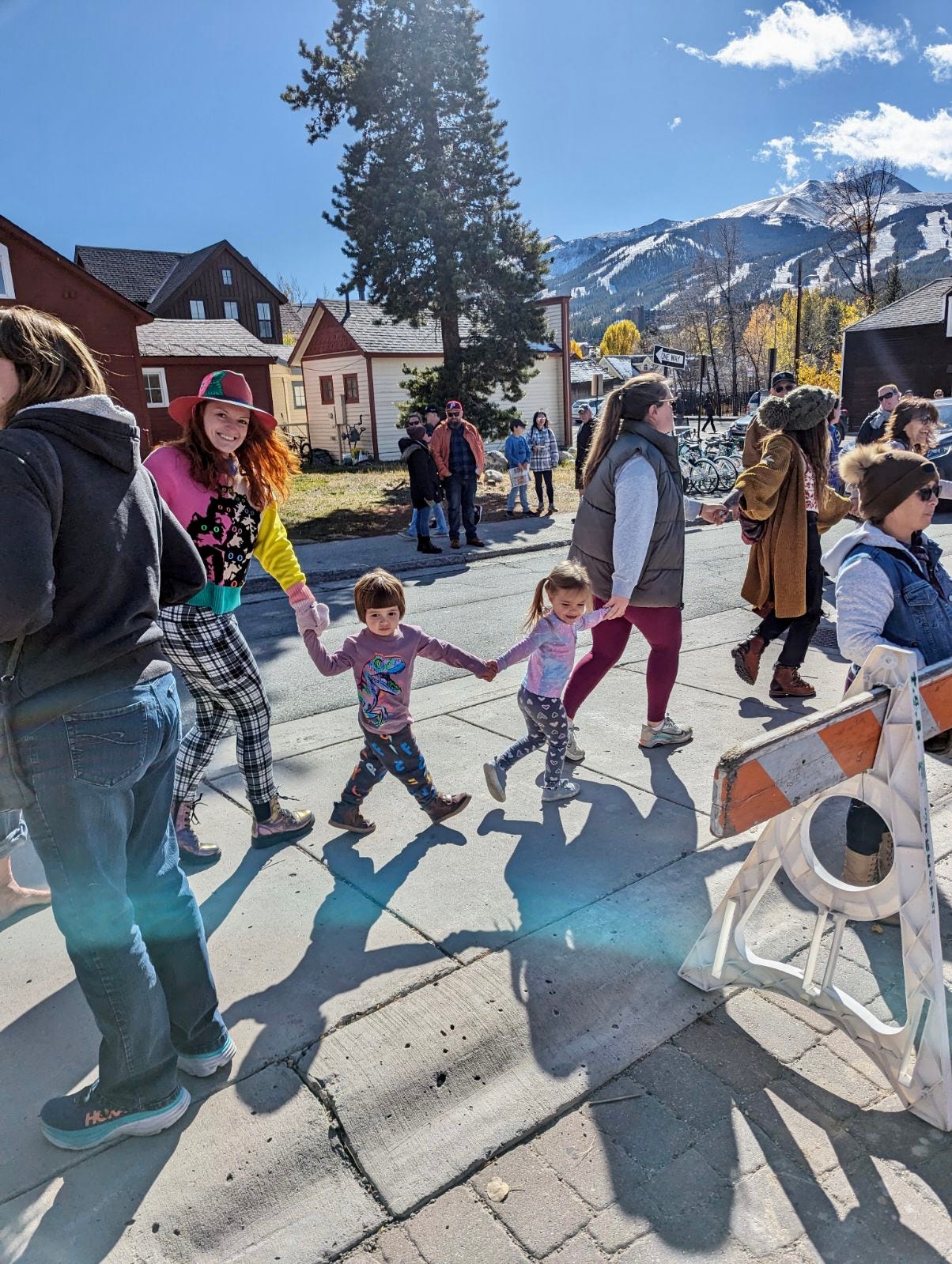
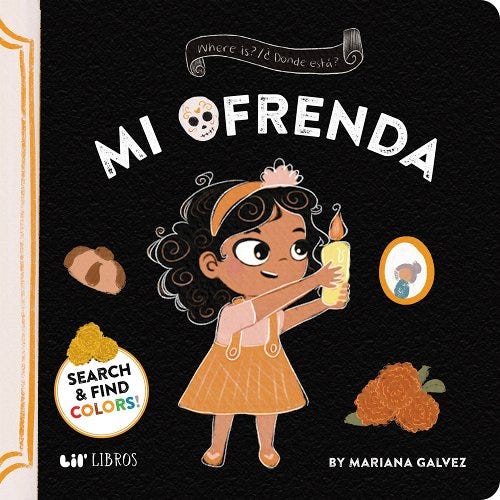
What’s your cultural heritage? What makes it special? And how are you teaching (or hoping to teach) your children about their family’s background?
Beautiful essay! It’s wild how imposter syndrome impacts us even on a cultural level. I feel like I’m “not Jewish enough” to mourn the lost lives in Israel with fellow Jews. I cried at a recent Latin food festival, watching a similar Mexican dance that you saw with Rio, but tried to hold back the tears because I didn’t want to look like a white woman who’s crying at Mexican culture even though I was crying because of the LOSS of my family’s own Mexican culture. I feel so much shame for not knowing Spanish, Yiddish, or Hebrew even though I’m aware the reason I wasn’t taught these languages is because of my family’s shame around their own culture.